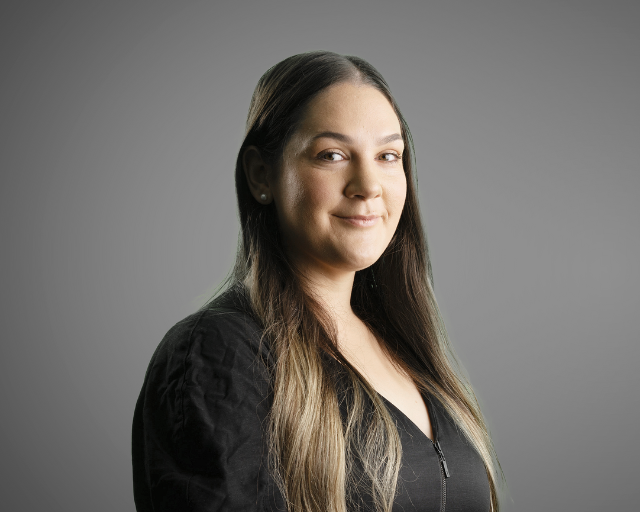YOUR PATHWAY INTO FAMILY DISPUTE RESOLUTION PRACTICE
Family Dispute Resolution (FDR) helps separated or divorcing families reach agreements about property, finances, and parenting without going to court. It focuses on communication, cooperation, and problem-solving to support better outcomes for families in transition.
A Family Dispute Resolution Practitioner (FDRP) is an independent professional who facilitates these conversations. In Australia, 97% of separating families resolve their issues through FDR rather than litigation, making it a vital part of the family law system.
At the College of Law, you can gain the qualifications and practical experience needed to become an accredited FDRP through postgraduate study in Family Dispute Resolution Practice.

At-a-glance: How to Become a Family Dispute Resolution Practitioner
This page covers:
- What does a Family Dispute Resolution Practitioner do day-to-day?
- Is Family Dispute Resolution a good area to specialise in?
- Who are the clients of an FDR practitioner?
- How stressful is Family Dispute Resolution compared to other practice areas?
- What personal strengths suit Family Dispute Resolution Practice?
- Pros and cons of a career in Family Dispute Resolution
- How do I become a Family Dispute Resolution Practitioner?
WHAT DOES A FAMILY DISPUTE RESOLUTION PRACTITIONER DO DAY-TO-DAY?
FDRPs assist families affected by separation to reach mutually acceptable agreements about parenting, property, and financial matters. They manage sessions where emotions can run high and guide parties toward workable outcomes.
Typical responsibilities include:
- Facilitating structured discussions between separating parties
- Helping clients identify issues and explore solutions
- Ensuring communication remains respectful and productive
- Issuing Section 60I Certificates when required under the Family Law Act 1975
- Identifying risks such as family violence or safety concerns and acting appropriately
If parties cannot agree, the FDRP is the only professional authorised to issue a Section 60I Certificate, which allows them to apply to the Family Court.
“Being an FDRP helps families at the most difficult time of their lives.” — Linda Kochanski AM
NEW TO THE FIELD?
Becoming an FDRP: What you need to know covers the FDRP pathway, entry requirements and RPL, program structure, the FDR5 practicum, time commitment, FAQs, and how to enrol.
IS FAMILY DISPUTE RESOLUTION A GOOD AREA TO SPECIALISE IN?
Yes. FDR is a growing field that offers both professional purpose and flexibility. As more families seek alternatives to litigation, qualified FDRPs are increasingly in demand across law firms, community organisations, and government services.
This work appeals to practitioners who want to move beyond the adversarial nature of traditional legal practice. It combines communication, negotiation, and empathy — helping people find common ground in difficult times.
“Students learn a different language — mediation language — that can truly move people.” — Linda Kochanski AM
5 Reasons to Become an Accredited FDRP
Considering Family Dispute Resolution? Learn why practitioners and graduates chose FDRP, career impact, accreditation pathway and real-world insights.
Read More
WHO ARE THE CLIENTS OF AN FDR PRACTITIONER?
FDRPs work with separated or separating couples, parents, and at times extended family members who need to agree on care of children or division of property. They often collaborate with family lawyers and other mediators, psychologists or counsellors, and community organisations or government agencies to support safe, informed decision-making.
The aim is to help clients reach their own agreements while keeping the focus on the best interests of the children and the family as a whole.
HOW STRESSFUL IS FAMILY DISPUTE RESOLUTION COMPARED TO OTHER PRACTICE AREAS?
While the work can be emotionally challenging, many practitioners describe it as deeply rewarding. You help families avoid costly, drawn-out litigation and support them through significant life changes.
Many FDRPs also enjoy a greater sense of work–life balance, with opportunities to work independently or within community and government services.
As one College of Law graduate put it,
“You can make a positive difference in people’s lives more quickly than when practising as a lawyer.”
WHAT ARE THE PROS AND CONS OF A CAREER IN FAMILY DISPUTE RESOLUTION?
Most practitioners find that the personal satisfaction of helping families move forward outweighs the challenges. Helping families move forward is meaningful and purposeful work.
| Pros | Cons |
|---|---|
| Personally rewarding: You directly help families rebuild relationships and make decisions that shape their future. | Emotionally challenging: You’ll often work with people in distress, conflict, or crisis. |
| Visible impact: You can often see real progress within a few sessions, with agreements reached, communication restored and stress reduced. | High responsibility: FDRPs must manage safety risks and ensure appropriate processes in complex family dynamics. |
| Strong career demand: Family Dispute Resolution is a growing area across both legal and social services. | Need for resilience: Regular self-reflection and supervision are essential to maintain wellbeing and objectivity. |
| Positive contribution: You play a key role in making family law more accessible, less adversarial, and more humane. | Ongoing professional learning: Staying accredited requires continuous development and awareness of legislative changes. |
HOW DO I BECOME A FAMILY DISPUTE RESOLUTION PRACTITIONER?
To become an accredited FDRP, you must:
- Hold an undergraduate degree or higher qualification in Law, Psychology, Social Work, Conflict Management, or a related field
- Complete a qualification that meets the curriculum and practicum requirements set by the Commonwealth Attorney-General’s Department
- Apply for accreditation through the Attorney-General’s Department
The College of Law’s Graduate Diploma of Family Dispute Resolution Practice covers six core units of competency of the CHC8115 Training Package via the following subjects:
- FDR1: Family Law and Mediation
- FDR2: Children’s Matters and Family Law
- FDR3: Advanced Family Dispute Resolution
- FDR4: Case Management Capstone
- FDR5: Virtual Simulated Practice (includes 20 hours of practicum, with exemptions available if completing your own placement)
After completion of the course, graduates are eligible to apply for accreditation and once accredited, begin practicing as FDRPs.
Graduate Diploma in Family Dispute Resolution (FDRP): Practical pathway to accreditation
Learn from experienced mediators in a hands-on program that blends live webinars, a mandatory 3-day workshop, and real-world practice via the FDR5 practicum or external placement. Designed for family lawyers and allied professionals, the course builds core FDR skills (active listening, trauma-informed practice, case management) and prepares you for the formal accreditation process with the Attorney-General’s Department.
- Two intakes per year (Feb & Aug); flexible block delivery
- Who it’s for: lawyers, social workers, psychologists, counsellors, HR and other professionals
- Career outcomes: FDRP roles in government or private practice; skills you’ll use from day one
“Our goal is for students to become competent, capable FDRPs ready to practise.” — Linda Kochanski AM
Updated : November 2025
ADVANCING YOUR CAREER WITH THE COLLEGE OF LAW
Family dispute resolution is more than an alternative to court — it’s a way to help families rebuild trust and stability. The College of Law’s postgraduate programs prepare you to manage complex family dynamics, guide constructive communication, and achieve lasting outcomes for clients.
Join a growing community of practitioners who are shaping the future of family law through empathy, skill, and collaboration.

My studies with the College provided me further insight into where family law is now looking to give some children a voice, particularly regarding parenting plans.
Josephine Byrnes-Luna, FDRP Graduate

Family law can be very litigious, but it doesn't have to be. So my practice in learning more about dispute resolution areas and how to manage dispute resolution and conflict resolution was valuable.
Emma Youdale, LLM Graduate - FDRP
NOT SURE WHETHER MEDIATION OR FDRP IS RIGHT FOR YOU?
Mediation or FDRP: the right path for you breaks down the differences and helps you choose the path that best fits your career goals.
FREQUENTLY ASKED QUESTIONS
To become accredited as an FDRP in Australia, you must hold a relevant tertiary qualification such as law, psychology, social work or conflict management, and complete an approved course in Family Dispute Resolution. The College of Law’s Graduate Diploma of Family Dispute Resolution Practice meets the standards set by the Commonwealth Attorney-General’s Department, including supervised practice. Once complete, you can apply for accreditation and once accredited, start practising as an accredited FDRP. View our checklist for accreditation.
FDR is a specialised, regulated form of mediation under the Family Law Act 1975. Only accredited FDRPs can issue a Section 60I Certificate, which confirms the parties have attempted dispute resolution before filing in the Federal Circuit Court and Family Court of Australia . Unlike general mediation, FDR focuses on family relationships, parenting and property division, with an emphasis on safety, child wellbeing and future-focused outcomes.
FDRPs help separating families reach agreements about parenting, property and finances without going to court. They facilitate discussions, manage emotions, identify safety risks and guide parties towards workable solutions. When agreement isn’t possible, the FDRP issues a Section 60I Certificate which enables a party to commence proceedings for parenting orders. It’s structured, people-centred work that combines legal understanding with emotional intelligence.
Accredited FDRPs are employed across Family Relationship Centres, community mediation services, government agencies, and private law or counselling practices. Many work part-time or independently, while others combine FDR with legal practice or mediation. Demand is strong across Australia as more families choose collaborative resolution over litigation.
Yes. FDR allows lawyers to use their legal expertise in a more constructive, client-centred environment. It’s well-suited to practitioners who want meaningful, balanced work that helps families move forward without the cost and stress of court. Many lawyers find FDR a natural progression — it builds on their legal knowledge while offering flexibility and the satisfaction of resolving conflict respectfully.
A section 60I Certificate is issued by an accredited Family Dispute Resolution Practitioner (FDRP) under section 60I of the Family Law Act 1975 (Cth). It confirms that parties have attempted, or been unable, to resolve a parenting dispute through Family Dispute Resolution (FDR).
You’ll need a section 60I Certificate before applying to the Federal Circuit and Family Court of Australia for parenting orders, unless an exemption applies (such as urgency or family violence).
Only registered FDR practitioners, accredited by the Commonwealth Attorney-General’s Department, can issue section 60I Certificates. They can do so when:
- Both parties attended and made a genuine effort to resolve their dispute
- One party did not attend
- The practitioner considered the matter unsuitable for FDR (for example, due to safety or power imbalance concerns)
The certificate tells the court what has occurred in FDR and helps it decide whether further dispute resolution is appropriate.


